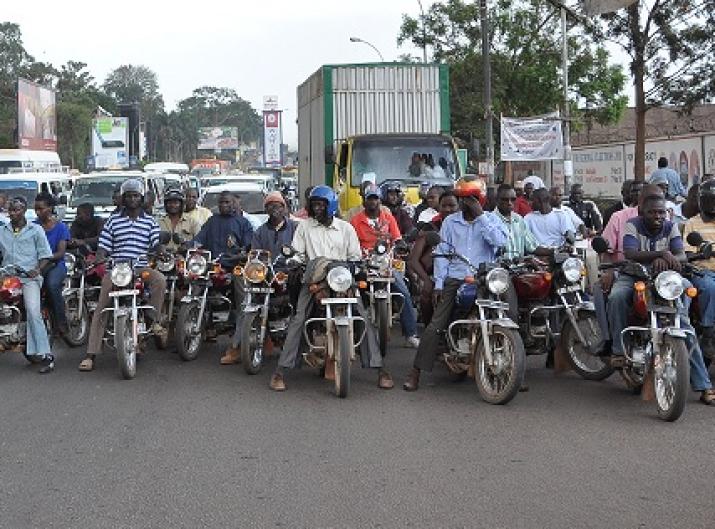
Boda bodas in Uganda
Published March 27, 2012, last updated on October 25, 2013 under Education News
Motorcycles, often referred to as boda bodas in Uganda and motos in Rwanda, are a common mode of transportation in urban cities across East Africa. However, helmet use among motorcyclists is not well studied. With funding from DGHI’s Global Health Third Year Study program (next funding deadline is April 2), Duke medical student June Tibaleka studied helmet use among motorcyclists and its effect on the severity of head injuries in Kampala, Uganda and Kigali, Rwanda.
Under the mentorship of Duke neurosurgeon and DGHI faculty member Michael Haglund, Tibaleka found a stark difference in the use of helmets from Kigali to Kampala. Her research shows 97 percent of motorcyclists on the streets of Kigali use helmets compared to only nine percent in Kampala. Tibaleka suggests this contrast may stem from differences in enforcement of existing helmet use laws from one country to the other.
Tibaleka also studied how helmet use affects the severity of head injuries sustained in road traffic accidents. Her research found that patients who used helmets suffered less severe head injuries than those without helmets. In Kigali where helmet use is high, motorcyclists who went to the hospital tended to have more severe head injuries. This suggests that helmet use may be keeping people with less severe injuries from coming to the hospital.
“Motorcycles are a fast-growing means of transportation in these East African cities and account for high morbidity and mortality due to injury,” said Tibaleka. “This research is relevant and important because it documented the role of helmet use in protecting against severe head injury in this high-risk population. We hope the study will influence policymakers to push for better enforcement of helmet laws, particularly in Uganda where helmet use is low.”
In December, the findings were presented to the Ministries of Health, Internal Affairs and the Traffic Police Departments in Uganda in an effort to ensure strict enforcement of existing helmet laws. Tibaleka is working with Haglund and Ugandan partners to implement a helmet campaign, and she plans to re-visit the study later this year to determine whether the effort was successful in increasing helmet use.
In Kampala, Haglund leads a twinning program at Mulago Hospital that combines delivery of surplus equipment and surgical training camps. Haglund’s latest research shows the program not only built overall surgical capacity at the hospital, but also improved efficiency and increased the complexity of cases performed by Ugandan neurosurgeons. New Mulago Hospital operating rooms were renovated and equipped with 21 tons of essential medical equipment valued at $4 million via the Duke Global Health PLUS (Placement of Life-changing Usable Surplus) Program, which is housed at the Duke Global Health Institute. Prior to this equipment, the hospital had only one functioning ventilator and very limited monitoring and surgical equipment.
DGHI is currently recruiting rising third-year medical students interested in doing global health research overseas. The deadline to apply for funding is April 2. For more information about the Third Year Global Health Study program, click here.


